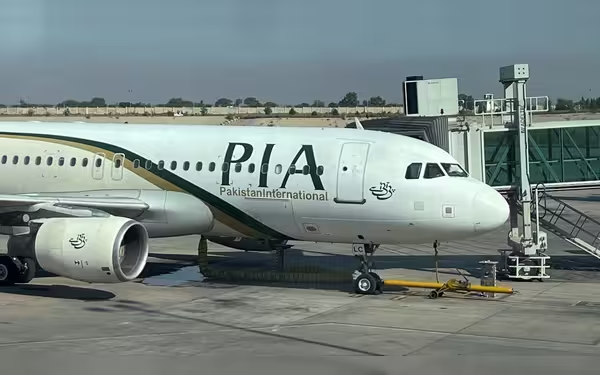Thursday, November 7, 2024 01:46 PM
PIA Privatization Plan Remains Unshaken Amid Sell-Off Concerns
- Government reaffirms commitment to PIA privatization.
- Concerns over job losses amid privatization discussions.
- Transparency and stakeholder engagement are crucial.
 Image Credits: tribune.com.pk
Image Credits: tribune.com.pkThe government remains committed to PIA's privatization despite sell-off concerns, aiming to enhance efficiency and competitiveness in the aviation sector.
The privatization of Pakistan International Airlines (PIA) has been a topic of discussion for quite some time. The national flag carrier has faced numerous challenges, including financial losses and operational inefficiencies. As the government continues to seek solutions to revitalize PIA, the privatization plan remains firmly on the agenda. This initiative aims to improve the airline's performance and restore its reputation in the aviation industry.
On Sunday, Privatization Minister Abdul Aleem Khan reaffirmed the government's commitment to privatizing PIA. He emphasized that the process will be conducted more effectively than in the past. "We have no objection if the Khyber-Pakhtunkhwa, Punjab, and Sindh governments collectively want to purchase PIA," the minister stated. This statement indicates a willingness to explore various avenues for the airline's future, including potential partnerships with provincial governments.
The ongoing sell-off fiasco, which has raised concerns among stakeholders, has not deterred the government's resolve. Many believe that privatization could be the key to unlocking PIA's potential, allowing it to compete more effectively in the global market. The airline has a rich history and a loyal customer base, but it has struggled to adapt to the changing dynamics of the aviation sector.
Critics of the privatization plan argue that it may lead to job losses and reduced services for passengers. However, supporters contend that privatization could lead to better management and investment, ultimately benefiting both employees and customers in the long run. The government must strike a balance between ensuring job security and fostering a competitive environment that encourages growth.
As the privatization process unfolds, it is crucial for the government to maintain transparency and engage with all stakeholders. This will help build trust and ensure that the interests of employees, customers, and investors are taken into account. The future of PIA hangs in the balance, and the decisions made in the coming months will be pivotal in determining whether the airline can soar to new heights or continue to struggle.
The privatization of PIA is not just a financial maneuver; it is a chance to reshape the future of Pakistan's aviation industry. With the right approach, this initiative could lead to a more efficient and competitive airline that serves the needs of its passengers while contributing to the country's economy. As the government moves forward, it is essential to keep the lines of communication open and ensure that all voices are heard in this critical process.













